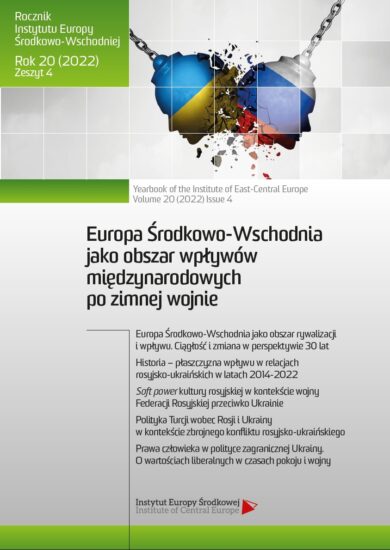Assumptions and goals of the Visegrad Group, the Three Seas Initiative and the Central European Initiative and the institutional and legal dimension of terrorist prevention in exemplary Member States: Hungary, Estonia, Latvia
ORCID: Barbara Wiśniewska-Paź: 0000-0001-9616-1105
Afiliacja: Uniwersytet Wrocławski, Polska
Pages: 85-107
Edition: Lublin 2022
DOI: https://doi.org/10.36874/RIESW.2022.4.5
Citation method: B. Wiśniewska-Paź, Założenia oraz cele Grupy Wyszehradzkiej, Inicjatywy Trójmorza i Inicjatywy Środkowoeuropejskiej a instytucjonalno-prawny wymiar prewencji terrorystycznej przykładowych państw członkowskich: Węgier, Estonii i Łotwy, „Rocznik Instytutu Europy Środkowo-Wschodniej” 20 (2022), z. 4, s. 85-107, DOI: https://doi.org/10.36874/RIESW.2022.4.5
Keywords: Central European Initiative, cooperation, eastern bloc, European Union, legal and institutional solutions, security, stabilization of the region, terrorism, terrorist prevention, Three Seas Initiative, Visegrad Group
Abstract: The aim of this article is to present the most important assumptions and goals of three international regional initiatives important from the point of view of Central, Central and Eastern Europe and Central and South Europe: the Visegrad Group, the Three Seas Initiative and the Central European Initiative, as well as institutional and legal solutions of selected countries associated with them in the field of terrorist prevention. For the analysis of the materials found, including studies and documents, the content analysis, the method of information synthesis and critical analysis were used. In addition, a case study, conceptual analysis and synthesis used in the description of key conclusions drawn after the literature review on various solutions, concepts and methods related to the presented issues (international regional initiatives, prevention and combating terrorism in exemplary countries) were used.
Bibliography:
3Seas.eu, Status Report of 2021, https://projects.3seas.eu/report.
Belniak S., Państwa Grupy Wyszehradzkiej po dwóch latach w Unii Europejskiej, Tarnów 2007.
Bezpieczeństwo antyterrorystyczne budynków użyteczności publicznej. Terroryzm – Strategie zwalczania – Edukacja antyterrorystyczna, t. 1, B. Wiśniewska-Paź, J. Stelmach (red.), Warszawa 2021.
Czubiński A., Historia powszechna, Poznań 2005.
Czyż A., Kubas S., Państwa Grupy Wyszehradzkiej, pomiędzy przeszłością a teraźniejszością, Katowice 2014.
Edukacja dla bezpieczeństwa. O kształtowaniu kultury bezpieczeństwa, A. Skrabacz, K. Loranty, L. Konarski (red.), Warszawa 2015.
Górczyk B., Współpraca Wyszehradzka: geneza, doświadczenia, perspektywy, Warszawa 1999.
Kowal P., Orzelska-Strączek A., Inicjatywa Trójmorza: geneza, cele i funkcjonowanie, Warszawa 2019.
Marples D., Historia ZSRR. Od rewolucji do rozpadu, Wrocław 2006.
Samsonowicz H., Historia Polski do roku 1795, Warszawa 1976.
State of Poland, Raport i strategia komunikacji Trójmorza, Fundacja State of Poland, Warszawa 2021, https://stateofpoland.pl/trojmorze-raport-i-strategia-komunikacji/.
Strategia Bezpieczeństwa Narodowego Rzeczpospolitej Polskiej 2020, BBN, Warszawa 2020.
Ukielski P., Aksamitny rozwód. Rola elit politycznych w procesie podziału Czechosłowacji, Wrocław 2007.
Wilczek J., Rudowski A., Fundusz Trójmorza. W stronę instytucjonalizacji Inicjatywy?, Warszawa 2021.
Wiśniewska-Paź B., Społeczne i edukacyjne konteksty bezpieczeństwa personalnego. Wzajemne relacje, implikacje teoretyczne, wymiary praktyczne, Toruń 2019.
World Population Review, Poorest Countries in Europe, 2021, https://worldpopulationreview.com/country-rankings/poorest-countries-in-europe.
XX-lecie wojny z terroryzmem – bilans i konsekwencje, Tom I, Współczesne zagrożenia, strategie reagowania – edukacja, red. B. Wiśniewska-Paź, D. Szlachter, Toruń 2022
XX-lecie wojny z terroryzmem – bilans i konsekwencje, Tom II, Infrastruktura krytyczna -analizy – case study, red. B. Wiśniewska-Paź, D. Szlachter, Toruń 2022

PDF: Download